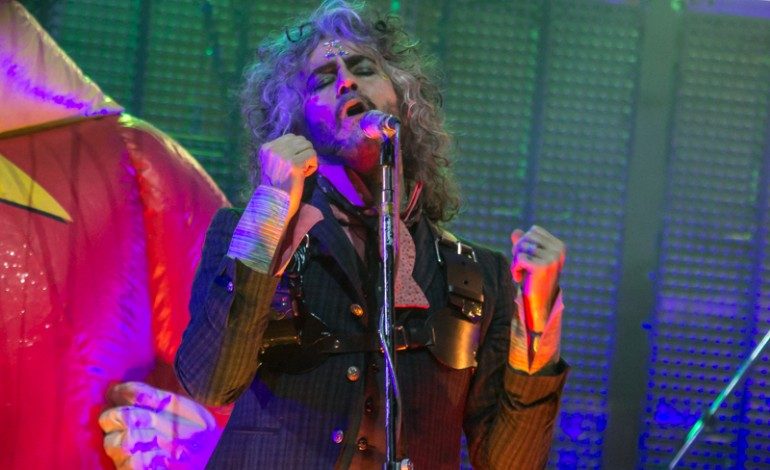

Grammy-winning indie rock band The Flaming Lips released their 16th album American Head in early September. Following the album’s release, the band played a socially distanced concert in October at The Criterion in Oklahoma City, where both the audience and band members were all protected inside individual space bubbles. mxdwn spoke with frontman Wayne Coyne about the writing process, the space bubble concert and what’s in store for future live performances.
mxdwn: Your new album American Head came out in September, was it completed before the pandemic this year?
Wayne Coyne: The album came out in September, but originally it was scheduled to come out in June. So I think by the end of February we were pretty much done with it. Then we started looking forward to what videos we would make and when we thought it was going to come out. But you know that was the end of February, and then in the middle of March, this whole thing hits. I think for a while we didn’t think about it very much—about the album—it just seems very weird to think ‘Hey what about our record?’ I mean we didn’t think that at all. We thought it was just entertainment, like who cares? We’ll get back to it. In the very beginning, you didn’t really know how alarmed you should be. Like, are people going to be dying in the streets? You didn’t really know. And then I think we considered it would be maybe a month, maybe two months and then we would just be back to business as usual. And now we see that’s not the case, and it may not ever be the case again. But back then, it sort of felt like you could stop everything for a month. And now it’s a different world now.
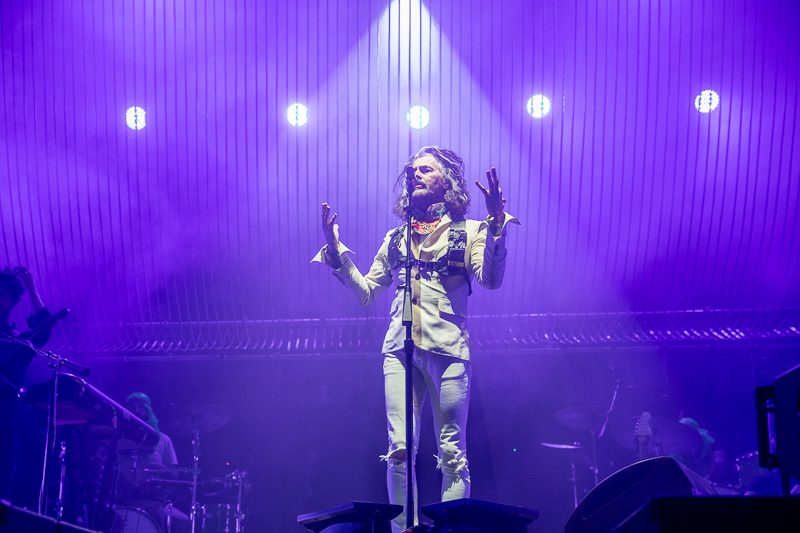

Photo Credit: Stephen Hoffmeister
mxdwn: How has social distancing affected your productivity and creativity?
WC: Before [COVID-19], it was going along quite rapidly. We could jump on airplanes and go to the studio, we could all just do stuff on a whim, it didn’t really matter. If we wanted to change schedules or something I could be on the flight this evening, and be in New York later tonight. I mean all those sorts of things. So all that stopped, which was a relief in a way because gosh, all that stuff just kills your time, you just don’t end up having any time for anything. You’re on an airplane or in a hotel room, it’s a lot of time spent in between stuff. Being on tour as a band like The Flaming Lips, we do so much traveling. We don’t really tour like a normal tour. A normal tour, the reason they call it a tour is because you’re kind of going from place to place. You’d be in Texas and then maybe play in Oklahoma and maybe Kansas, but I mean we don’t really tour like that. We’ll be in Japan one day and then two days later we’re in Australia. It’s like we are just jumping wherever. You can do it, but it does zap you. You wouldn’t want to be doing too many creative things being that exhausted. I mean, you can do a lot of things with resolve, but you don’t really want to be too creative because it just takes a lot of your energy. And then a lot of collaborating that we would do, I have a studio in my house so there is some version of the guys here almost every day. And so for the first couple of months it was nothing. So in that way, after we weren’t scared that we’re all going to die, I was glad to not have so much going. It’s fun to sit there by yourself and do stuff. I do a lot of painting and stuff like that so it’s nice. But I’ve got a good job where I’m not that worried about making any money. If I don’t for the next six months, I’m going to be all right anyway and that’s not the case for most people. So I don’t want to make it seem like it’s all good. My situation isn’t like everybody’s. So in that way, I think what most people like to do is to try to find just some good things about it, the positive things about it. We’ve been very lucky. Nobody in our family has gotten overly sick and we are alright with our jobs and stuff like that.
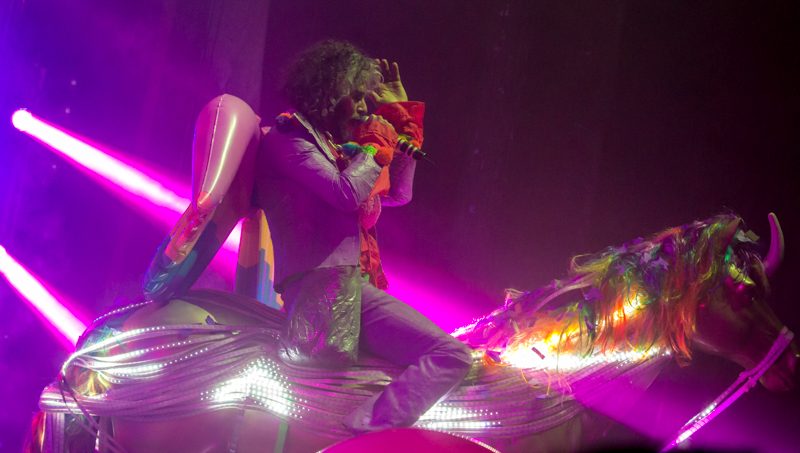

Photo Credit: Mauricio Alvarado
mxdwn: The Flaming Lips are known for your amazing live performances, do you keep live shows in mind when creating a new album or do you focus mainly on the music at first?
WC: We’ve been making albums and playing shows for so long together, there would be plenty of albums that we’ve made where we’ll be in the studio on Monday, and then we’ll be going somewhere to play shows on Thursday, Friday and Saturday. That’s been happening to us for a long long time, so it’s never been a long time since we would stop making records and then get ready for the next thing. It all kind of jumbled together since the late ’90s, but you don’t really think about it like that. And I mean for us, writing songs and making records, that’s a completely different world than playing live shows. Even though I could see that, if you didn’t make a record and didn’t play shows you would think they would be separate, and I did think that when I was younger. I thought it was like whatever you’re playing at your shows that’s what you would make on the record. But it’s not, it hasn’t been like that in a long, long time. I mean maybe in the early ’90s or something like that a long time ago. I think a lot of groups do, but we don’t. When we’re thinking of these songs it would just never occur to us ‘What are we going to do if people want us to sing the song in front of them?’ So in that way no, but I think that the audience likes any of your music enough to want to hear you play it. Any music that we have, even music that’s 30 years old, we gladly would play anything they like. It doesn’t matter if we can figure out a way to play it and make it sound great and make it look great.
mxdwn: Recently, you performed at your first all-bubble concert [and have since announced two full all-bubble concerts in Oklahoma]. What was it like performing to an audience of bubbles? Was the energy the same as a traditional concert?
WC: Well, we’ve been working towards this. We did a smaller version of it on The Stephen Colbert Show. I think we did that back in May. Part of that, even when we did it in May we thought, ‘Now is this still going to be going on.?’ We thought, ‘Oh this is going to be ending any week now.’ So the longer we’ve been in this, the more you get used to what’s it gonna take to put on a show. In the very beginning, it wasn’t really a joke, but we would like to mention how absurd it is that we may have to do a concert where everybody would have to be in a space bubble. I would be in this space bubble and everybody else would be too, the whole band and the audience. And I think as it’s gone on, that’s become not so much of a joke and it’s just down to how we would really do it. So I think for this thing that we just did a couple of weeks ago, I mean the main thing that we focused on was how can we make it safe. We know the bubbles have this potential to be safe, but you still have to be in a line outside, you still have to get in the bubble, you have to get out of the bubble to go to the bathroom and all these practical things about it. As long as you’re in the bubble you’re safe, but how do you do all the other stuff? So when we did this video shoot a couple of weeks ago, we had worked on all that stuff so much that I couldn’t actually believe we were doing the concert by the time I got up there to sing. I was like ‘Holy shit we’re really doing this!’ I mean I just kept thinking that we would stop it or something. If something happened, I warned everybody, ‘Look if this doesn’t go the way we want it to we will just stop.’ Luckily, it was just a video shoot. Even though it was a performance, it wasn’t like people paid a lot of money. Everybody that was there had been invited to be there. I kept thinking that if this doesn’t go right, I’ll just say let’s just try it again a couple of weeks from now or whatever. But then it really went fast and it went great and everybody really cooperated. I was surprised at how great everyone was. I mean it is a Flaming Lips audience, so that’s a little bit greater than just the normal rock and roll audience or whatever. But I was just amazed at how great it all went and then suddenly there we go, we’re getting up to play in the space bubble. I really could not quite believe it. But then it all is happening so fast. You start a song and you know it sort of just goes and then you’re on to the next song or whatever. So in that way, I don’t think I took it all in until a couple of days after it was over. I was just waiting for someone to say ‘This person passed out or this person got hurt or this person was sick’ or whatever. But as time got away from it and it didn’t seem like anything bad was going to happen, I started to be able to be like this is great, this is really cool and maybe this is a way that we could do more shows like this. So it wasn’t until really a few days afterward that I was getting the real impact of what was happening.
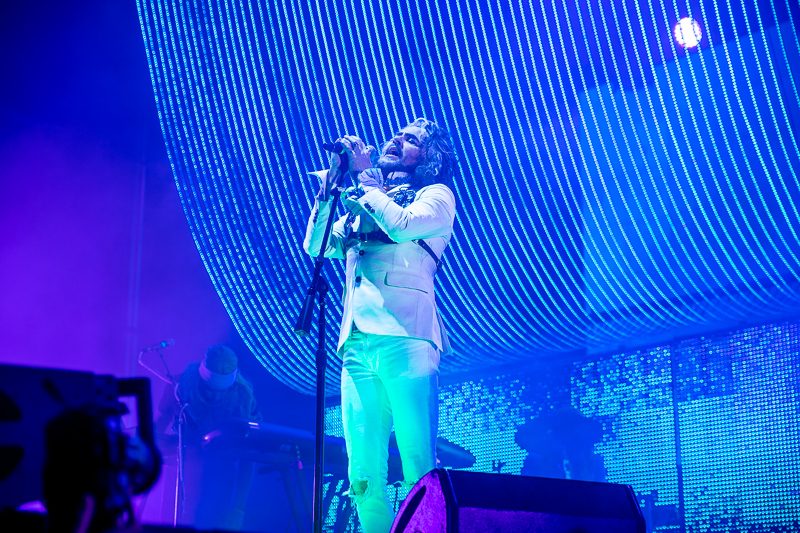

Photo Credit: Stephen Hoffmeister
mxdwn: Is there a possibility of The Flaming Lips going on an all-bubble tour in the future?
WC: Yeah, I think that this venue that we’re using in Oklahoma City—that’s where you’re speaking with me from. Oklahoma City where I live—we know the people. We’ve actually played shows there and it’s like a lot of venues around America, sitting there virtually empty. And so they’ve allowed us to go in there and start to use it and play around and see how it’ll all work, and there’s a lot of areas where you can do staging and you can have a big distance between people in lines and they have big bathrooms and all these things that make it a really great spot to try this out. So I think we’re going to announce after the election that we are gonna put one show up for sale, and that show will happen at the beginning of December and then we’ll see what happens.
mxdwn: That’s really exciting!
WC: It’s insanely exciting! It starts as exciting and fun, and then it quickly turns to be stressful and like ‘Oh shit we are really going to do this.’ But everything is kind of like that, you know, you kind of have to take it seriously. I think in the stages that we’ve done it in, it’s not been so overwhelming that we’ve missed something important. I think that’s been a great relief because a lot of times you’re just working so fast that there is no time. Lucky the pandemic has kind of slowed everything down and it has allowed us to take the time and make sure that it’s safe, that everybody knows what’s happening and everybody is paying attention to the health cautions and all that. So I think it could be really wonderful. I don’t really know if this going to happen for another year, another five years? I mean you can’t tell.
mxdwn: You wrote an essay where you talked about not having thought of yourselves as an ‘American band,’ what bands did you use to think of as ‘American bands’ before you changed your perspective on the title?
WC: Well, we would think of bands like the Eagles or the Grateful Dead or even Tom Petty. I mean this was something that we thought was kind of absurd about our thinking. We’re from Oklahoma and virtually everybody that’s ever heard of us thought of us as an American band, but we never did. We just thought ‘We’re just musicians on earth.’ I don’t really think of us as being from America or wherever, but we are. This is dorky musician sort of stuff, but there are certain melodic changes and there are certain chord progressions that feel European or they feel more Asian or they feel more Italian. There are all these little flavors of the way music is made and we make so many records, we’ve been around forever and we just consider all these things. When we announced it to ourselves that we were going to sound like an American band, it sort of let us know what we were going to hone in on. I think part of us would say we don’t know what it is but we know what it’s not. So without guidance, if it started to sound like this other thing then we thought, ‘No that’s another flavor.’ So I think as we went on we got better and better at knowing it’s not rhythm and blues, it’s not gospel, it’s not folk music, it’s just other things. And that is probably classic, it probably is something like classic rock in a way, but it’s not just that. There’s not as much rock, it’s the storytelling-cinematic kind. And there is drama to it, but it’s based on real-life drama. It’s really very hard to describe. I think that’s why we would start to make music because it’s hard to describe but once you hear it you’re like ‘I know what that is!’
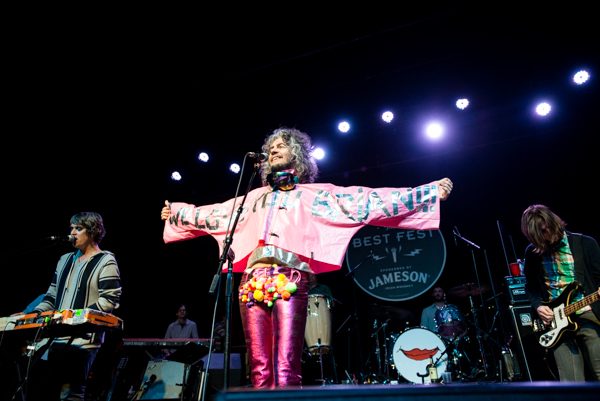

Photo Credit: Sharon Alagna
mxdwn: Yeah! The album has a very nostalgic feel. Were you reflecting on anything in particular while writing it?
WC: All the time really! But most musicians and artists, they’re dorks like us and we’re always nostalgic, we’re always sentimental. Everything we do is nostalgia and I think that’s what music is in a lot of ways. It is a way that you can travel back in time, the time being your own mind and your own memories, and try to relive what that emotion is. I think music is probably one of the only real time machines that lets you do that. Like with the way that Steven and I would write music, I’ll have a piece of music and it will evoke things in him and he’ll start to color it with this evocative stuff. And the same will happen to me, he’ll make something that feels very nostalgic or very melancholy or very sad, and then it’s making me think of things, it’s making me remember things. Without the music we wouldn’t really have a mechanism to think about these things or to talk about them. Once the music starts to happen it’s kind of like looking through an old yearbook or something, suddenly you remember. ‘I remember that I remember this.’ It’s just triggering evocative things. So once we decided that we were going to pursue that and it starts to go well as opposed to going badly or whatever, then you embrace it and say ‘Let’s see what else can happen here.’ I would think about something and that would make Stephen think about this or that, one thing sort of approaching the next. I think you’d have ideas of what you want to do, but none of it really matters as ideas, what really matters is what you’re doing, what it sounds like and what it really is. We’ve gotten better and better at letting go of what we think it should be and embracing what it really is. And some of that really helped. I think we make music and we’re not trying to hone in on a specific mood or emotion. We’re easily satisfied with it being just weird shit. Towards this record, we really did want it to tell these stories. We wanted to impart some of the emotions that we have into the listener and not just have them not understand what the fuck we’re talking about. So we are glad that we stuck to that part of our mission.
Featured Image Photo Credit: Mauricio Alvarado
